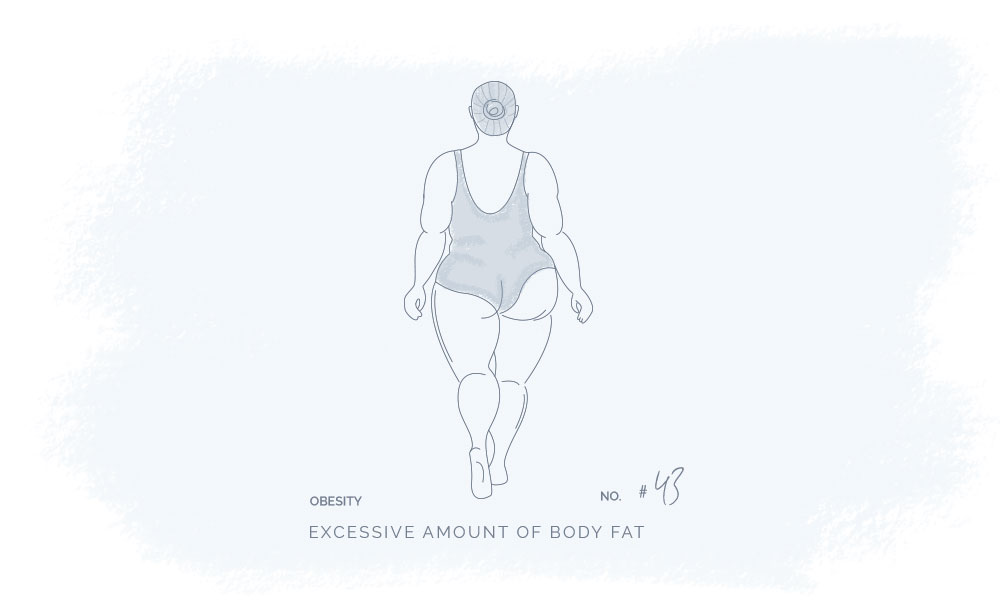Obesity
Category
Genetic, Metabolic, Nutritional, Endocrine
REVIEWED BY
Our Biomedical Scientist
Reviewed based on
Literature Review
Last update
November 2020

What is Obesity
Obesity is a common and complex disease that leads to an excessive amount of body fat. Obesity increases the risk of severe conditions and health problems like diabetes (type 2), high blood pressure, heart disease, and certain types of cancer.1
How to determine and diagnose obesity?
Body mass index (BMI) is often used to diagnose obesity and possibly identify potential risk factors.
Obesity is diagnosed when BMI is 30 or higher and this can be determined by:
BMI= Weight (kg) / Height2 (cm)
However, BMI is not fully adequate as it does not directly measure body fat. Some people like athletes may have high BMI and be incorrectly classified as obese due to the weight of their muscles.1
Harvard School of Public Health has identified 10 methods to measure obesity including BMI. Other methods that can help determine body fat include waist circumference and waist-to-hip ratio in order to provide a prediction of the disease development and death associated with obesity. 2
Symptoms
Day-to-day symptoms of obesity:3
- Quickly being out of breath
- Increased sweating
- Difficulty performing physical activity
- Pain in joints and back
- Increased snoring
- Psychological problems associated with the feeling of isolation and low self-esteem may affect relationships with family and friends.
Development of conditions due to obesity:4
- Osteoarthritis
- Heart disease
- Stroke
- Diabetes (type 2)
- Sleep apnea
- Fertility problems
- Gallstones
- Specific types of cancer
The connection between Cannabinoids & Obesity
Studies find that CBD and THC may have great therapeutic potential and may be used to help treat Obesity. CBD and THC are well-known cannabinoids, however, they do not have the same psychoactive effects. THC is psychoactive while CBD does not possess psychoactive effects. According to WHO guidelines, the cannabidiol CBD is generally well tolerated with a good safety profile.
Cannabinoid receptors are involved in regulating food intake and inflammation; therefore, cannabinoids may have a therapeutic potential in the treatment of obesity.5
Additionally, preclinical data proposes that the cannabinoids THCV and CBD may have a beneficial effect on weight loss, suggesting that these cannabinoids may be of interest in treating obesity.6
The literature discussion is an overview of the published results from scientific studies investigating if and how cannabinoids can be beneficial in the treatment of Obesity. The overview will be updated regularly to ensure the newest and most accurate information.
THVC, THC and CBD may play a beneficial role in weight loss and metabolic syndrome
It was found that the amount of circulating lipids can be reduced by THCV and CBD. Moreover, weight-loss can be stimulated by the same cannabinoids.7
Low doses of THCV (from 3mg/kg) stimulated hypophagia and reduction in body weight, proposing that THCV may be used in treating obesity and metabolic syndrome. These effects can be removed when combining THC with THCV, but they can be reversed when combining them with CBD.7,8,9
In contrast to THCV, Rimonabant (anorectic anti-obesity drug) exhibited anxiogenic activities. This could due to THCV acting as a neutral CB1 receptor antagonist while Rimonabant functions as an inverse agonist. 10</sup
Clinical trials are research studies that examine new treatments and evaluate their effects on human health outcomes.
Synthetic cannabinoids causing successful weight loss but with side effects
Many clinical trials aimed to show that synthetic cannabinoids can help reduce body intake by blocking CB1. Although significant weight loss was caused by these synthetic cannabinoids, these clinical trials were left behind because these cannabinoids produced excessive adverse reactions such as depression, vertigo, heart problems, etc. 11,12,13
- https://www.mayoclinic.org/diseases-conditions/obesity/symptoms-causes/syc-20375742
- https://www.hsph.harvard.edu/obesity-prevention-source/obesity-definition/how-to-measure-body-fatness/
- https://www.nhs.uk/conditions/obesity/
- https://www.healthline.com/health/weight-loss/obesity#complications
- Rossi, F., Et Al., (2018). ” Role of Cannabinoids in Obesity”: https://www.ncbi.nlm.nih.gov/pmc/articles/PMC6163475/
- https://ghmedical.com/endocannabinoid-system/diseases/obesity
- Silvestri, C., Et Al., (2015). ” Two non-psychoactive cannabinoids reduce intracellular lipid levels and inhibit hepatosteatosis”. https://www.journal-of-hepatology.eu/article/S0168-8278(15)00003-3/fulltext
- Riedel, G., Et Al. (2009). ” Synthetic and plant-derived cannabinoid receptor antagonists show hypophagic properties in fasted and non-fasted mice”. https://bpspubs.onlinelibrary.wiley.com/doi/full/10.1111/j.1476-5381.2008.00107.x
- Wargent, E.T., Et Al., (2013). “The cannabinoid Δ9-tetrahydrocannabivarin (THCV) ameliorates insulin sensitivity in two mouse models of obesity”. https://www.nature.com/articles/nutd20139
- O’Brien, L.D., Et Al., (2013). ” Effect of chronic exposure to rimonabant and phytocannabinoids on anxiety-like behavior and saccharin palatability”. https://www.sciencedirect.com/science/article/abs/pii/S0091305712002985?via%3Dihub
- Bergholm, R., Et Al., (2012). ” CB(1) blockade-induced weight loss over 48 weeks decreases liver fat in proportion to weight loss in humans”. https://pubmed.ncbi.nlm.nih.gov/22828945/
- Kipnes, M.S., Et Al., (2010). ” A one-year study to assess the safety and efficacy of the CB1R inverse agonist taranabant in overweight and obese patients with type 2 diabetes”. https://pubmed.ncbi.nlm.nih.gov/20518807/
- Motaghedi, R., Et Al., (2011). “Psychiatric adverse effects of rimonobant in adults with Prader Willi syndrome”. https://pubmed.ncbi.nlm.nih.gov/20965292/
CANNABINOIDS & RECEPTORS
Below you find the plant cannabinoids, cannabinoid receptors, and endocannabinoids that are associated with the potential therapy.
- CBD
- THC
- THCV
- CB1
- TRPV1
- PPARa
- GPR119
- Anandamide
- OEA
- 2AG
- EPEA
- DHEA
If you have any further information relevant to the connection between Obesity and cannabinoids or find any of the information inaccurate, outdated or incomplete please contact us here.

